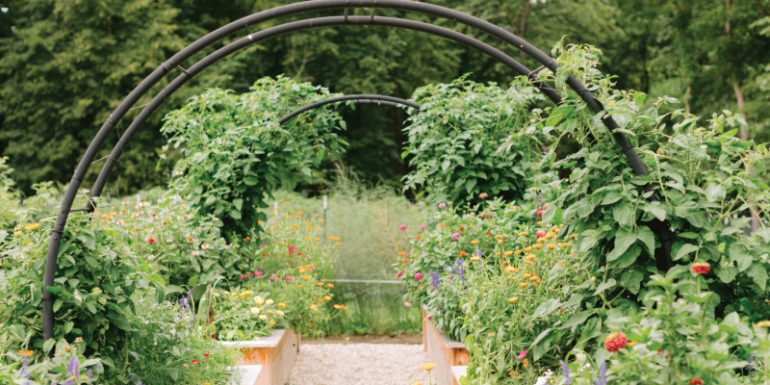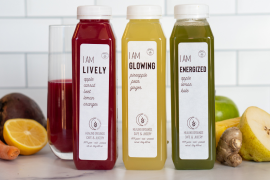By Shelby Deering | Photo: Sonya Kammes courtesy of Katie Oglesby
Picture a beautiful summer day. Your pasta sauce is simmering, and your noodles are al dente.
Everything smells amazing, but your meal seems to be missing something. That’s when you walk out to your organic garden to pluck some fresh basil and oregano. You drop the herbs into your pasta, and … perfection.
If this sounds like a lovely way to add flavor to your dinner, you can make this a reality, even if you’re not an experienced gardener. An organic garden in the backyard is a great alternative to high- priced groceries that feel like they just get more expensive every day. And it’s an opportunity to include lots of healthy, organic produce on your dining table throughout the growing season.
These are some of the reasons that home gardening is trending, and that more and more people are gravitating toward organic gardening. But what exactly is organic gardening? What makes something organic?
“Organic farming prioritizes healthy soil, healthy plants and a healthy environment to produce the healthiest food,” explains Katie Oglesby, a Lake Geneva-based garden designer and certified health coach. “Organic practices differ from conventional growing practices by eliminating synthetic chemical pesticides andherbicides,andutilizingmorenatural products that are lower in toxicity.”
Soil is also a big priority when it comes to organic gardening. Oglesby says that the soil helps to start plants and seeds off in the healthiest environment possible, which will lead to the best results.
THE APPEAL OF ORGANIC GARDENING
Since the start of the pandemic, home gardening has grown in popularity more than ever. Herb and vegetable company Bonnie Plants reported that in 2020, 20 million novices started their first-ever gardens. And the trend continues to gain steam.
“The pandemic has forced us all to change how we live,” says Lis Friemoth of The Garden Hoe. The Walworth County-based garden consultant says that green plants, food plants and flowering plants all add quality to our home lives.
“I think people are starting to realize that food is medicine,” Oglesby says, citing her own experience suffering from a health crisis, which inspired her to better understand the food system and make sure that she was eating the healthiest food she could find and grow.
“Increasing food costs have also caused people to look at our food supply chain,” she says. “Families are putting an emphasis on raising their children to understand how and where their food comes from. Gardening has become a family affair, both outside in the vegetable patch, and then also bringing that bounty into the kitchen and making a meal out of it, and sharing food around the dinner table.”
WHAT ARE THE HEALTH BENEFITS OF EATING ORGANIC PRODUCE?
Jeanne Nolan is an organic gardening consultant and author of the book “From the Ground Up.” She and her husband Verdant co-own The Organic Gardener, a gardening consulting firm in Northbrook, Illinois, and have consulted on projects in the Lake Geneva area. Both agree that two of the primary benefits to organic gardening are health and taste.
The Nolans explain their organic gardening philosophy: “More nutrient-dense than conventional produce, homegrown fruits and vegetables can improve the eating habits of adults and children, and can offer an unparalleled taste experience: juicy, crisp, with a great depth of flavor and intensity.”
Organic produce can be healthier than conventional produce because, as Oglesby points out, on average, our food travels over 1,200 miles to reach us, which can obscure the processes used in the growing cycle. She says that when you grow your own produce, you know exactly where it came from, how it was cared for, and that it was harvested and enjoyed at its peak nutrition value.
There are also benefits to be found in the act of gardening itself. “Growing food offers an accessible way to connect with the natural world,” the Nolans explain. “Working in a garden is an antidote to the sedentary, indoor lifestyles that are becoming increasingly prevalent in a technology-driven world.”
In addition to these personal benefits, organic farming can be much gentler on the environment, because it decreases the amount of chemicals leaching into the soil or air as a result of toxic pesticides, Oglesby explains.
GETTING STARTED
Starting an organic garden may seem daunting if it’s something you’ve never done before, so our experts recommend you break it down into steps.
“Start by setting your goals,” the Nolans advise. “Why do you want to grow a garden? How much food do you want to grow? Once you have a sense of what size garden you want, choose a spot with adequate sunlight and good soil quality, and create a simple plan in which you map out where you want to put paths and rows and the rough location of each crop.”
Oglesby says that raised beds or containers are the quickest and easiest ways to get started, since these are lower maintenance options than in-ground gardening. “You have control of your soil from the start,” she says.
SUNNY SPACE AND THE RIGHT SUPPLIES
“How much space you need for an organic garden depends on how much produce you want to grow,” the Nolans suggest. “An ideal garden space will receive 6 to 8 hours of full sun per day and have healthy soil full of microbial life.”
If you decide to go with a container garden, Friemoth says that you can purchase a 10″ container. Just make sure that it’s clean and disease- and insect-free before filling it with potting soil.
Or you might decide to just go with a very small plot in your backyard. “You can start as small as a 4-foot-by-4-foot salad garden or culinary herb garden and enjoy greens for months,” Oglesby says. “Many of my clients start at around 64 square feet for a great entry-size garden.” However, she points out that the bigger the plant size and the more varieties you want to plant, the more space you’ll need.
After you’ve chosen a space and mapped out your garden, you’ll need to gather supplies.
Our experts recommend:
- Organic plants and seeds
- Organic compost
- Trowel
- Hand rake
- Pruners
- Plant markers
- Trellises for climbing plants
- Garden gloves
- A full-coverage hat
Organic Gardening Tips and Tricks
Each gardening pro has plenty of words of wisdom to share for first-time organic gardeners.
The Nolans encourage beginners to be adventurous and add a vegetable you’ve never eaten before to your crop list. Add flowers for color and texture alongside your herbs and veggies. And most importantly, stay on top of your weeding.
Friemoth emphasizes the benefits of seeking advice from your neighbors who garden successfully. “They have spent years learning what works in your area,” she says. She also points out that local garden centers have decades of experience in growing all manner of plants. “Take advantage of their expertise,” she recommends.
Oglesby says that it can be helpful to focus on maintenance of the garden. “Learn the best preservation practices for the varieties of plants you choose to grow,” she advises. This involves monitoring your garden to identify any pests or disease issues — the earlier, the better. “Being proactive in the garden is key to success,” she says. “Being a gardener is being a forever learner. Embrace the wins and the losses.”
Friemoth point out that the rewards you can reap from organic gardening are abundant. “Gardening takes a bit of physical work,” she says. “The rewards — fresh air, sunshine, beauty and homegrown food — make it a worthwhile endeavor. Adding organic to the mix encourages you to incorporate contemplation of the surrounding environment, to use best practices when working with Momma Nature and ultimately, gives you a sense of where you fit into the world. Not a bad return for the price of an organic seed packet.”
The Best Starter Plants
Whether you’ve grown your fair share of produce or are thinking about starting a garden for the very first time, you should know that Wisconsin is actually a fantastic place for home gardens. Jeanne and Verdant Nolan say that despite our long, cold winters, the Midwest has a fairly long growing season that provides plenty of time to nurture a wide range of crops.
With that in mind, our gardening experts share their favorite starter plants for newbies. “Great entry-level or starter plants to grow are herbs and greens,” Lake Geneva-based garden designer Katie Oglesby says.
“They are the easiest to grow and can be grown in small spaces.” After that, she says that the next level would be fruiting plants, which include beans, cucumbers and tomatoes. And for fruit? “Strawberries would be an easy start for fruit plants,” she adds.
Also consider:
- Arugula
- Lettuce
- Edamame
- Basil
- Beets
- Kale
- Onions
- Peas
- Potatoes
- Radishes
- Spinach
- Squash
- Zucchini
- Chamomile
- Chives
- Dill
- Mint (place in containers to prevent unwanted spread)
- Rosemary
- Sage
- Thyme
- Flowers like cosmos, geraniums, lavender, marigolds, nasturtiums and sunflowers





